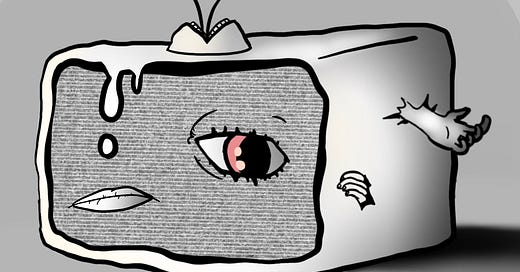You probably remember the story: five children win a lifetime supply of chocolate, and a tour of Wonka's factory. The hero, Charlie Bucket, is kind-hearted and generous. As for the others, Augustus Gloop is a glutton, Veruca Salt is spoiled, Violet Beauregarde is self-obsessed, and Mike Teavee…is somewhat rude, and maybe likes to watch too much television. The novel is infused with sympathy and admiration for Charlie, loathing of the others, and approval of each child's fate—horrible bodily transformation for everyone, except Charlie, who receives the entire factory as a parting gift. The story's loathing manifests most clearly in the moralizing rhymes the Oompa-Loompas sing after each child gets in trouble. They condemn Mike as harshly as the others:
The most important thing we've learned, So far as children are concerned, Is never, never, NEVER let Them near your television set— [...] But did you ever stop to think, To wonder just exactly what This does to your beloved tot? IT ROTS THE SENSES IN THE HEAD! IT KILLS IMAGINATION DEAD! IT CLOGS AND CLUTTERS UP THE MIND! [...] HIS BRAIN BECOMES AS SOFT AS CHEESE! HIS POWERS OF THINKING RUST AND FREEZE! [...] P.S. Regarding Mike Teavee, We very much regret that we Shall simply have to wait and see If we can get him back his height. But if we can't—it serves him right.
But Mike is not really that bad, and does not merit being so despised.
Keep reading with a 7-day free trial
Subscribe to Mostly Aesthetics to keep reading this post and get 7 days of free access to the full post archives.




